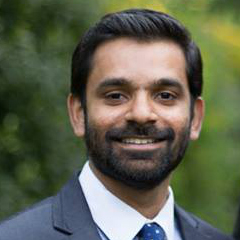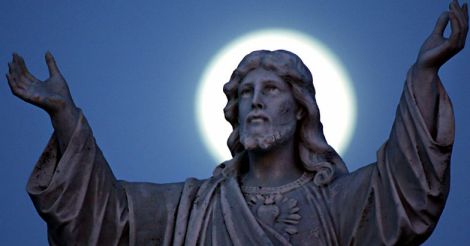As a rational thinker who considers reading history seriously, I was intrigued about the book 'Christ Parichay' which claims that ‘Christ was a Tamil Hindu who worshipped Lord Shiva'.
It’s been said that the book authored by Ganesh Damodar Savarkar, a founder of Rashtriya Swayamsevak Sangh (RSS), is re-entering the Indian marketplace this week.
Not only does the book claim that Jesus Christ was a Tamil Hindu, but it states that he underwent a sacred thread ceremony as per Brahmin traditions.
It states that Jesus Christ did not die on the cross. Instead, he was helped by people who practised Yoga and spiritual science that revived him through medicinal herbs from the Himalayas. There are many such intriguing claims that are doing the rounds.
Read: Christ was a Tamil Hindu, worshipped Lord Shiva: RSS founder's book
Savarkar is not the first to make such claims about Christ. He is in company of people like Nicolas Notovich, Mirza Ghulam Ahmad and Holger Kersten. However when it passes through the intense scrutiny of reason and historical evidence, these views fail to pass muster. Jesus Christ wasn't a Hindu and nor did he speak Tamil. This conclusion can be deduced taking into account historical evidence.
Historical evidences
Consider this. For Jesus Christ to speak Tamil in the 1st century, Jesus would have to be in the vicinity of what was then called the Tamilakam or the Ancient Tamil country.
However, there is no historical evidence that proves this hypothesis. On the contrary, there is overwhelming evidence, which tells us that Jesus Christ, lived in the town of Nazareth in Galilee and most of his travelling was inside the Judea-Roman world of the early 1st century.
While reporting on the Emperor Nero's decision to blame the Christians for the fire that destroyed Rome in A.D. 64, the Roman historian Tacitus (born AD 56—died c. 120) made a clear reference to Jesus Christ. This attestation by Tacitus about Jesus Christ who lived and ‘suffered extreme penalty during the reign of Tiberius at the hands of Pontius Pilate’ is one of historically authentic, non-biblical accounts that asserts the existence of Jesus Christ within Roman rule.
Tacitus’ account clearly mentions that Christ existed during the reign of Tiberius. History books tell us that Tiberius Caesar was a Roman Emperor who reigned between A.D. 14-37. Jesus Christ was in the Judea-Roman province under the rule of Pontius Pilate, who served Tiberius Caesar, the emperor.
Even though we find historical records of Indo-Roman trade, it is clear that India, or the modern day Tamil Nadu, wasn’t under the reign of Tiberius Caesar. Hence we can be certain that Jesus Christ wasn’t living in Tamilakam.
Other historical evidences from Pliny the Younger (AD 112), the Babylonian Talmud (AD 70-200), Lucian, and from a Jewish Historian Flavius Josephus (born AD 37- died 100) leaves us with immense evidence to state that Jesus was a Jew hailing from the Judea-Roman world.
While narrating the history of Jews in his book Antiquities, Josephus mentions Jesus Christ.
This mention is well known among scholars as the "Testimonium Flavianum". Josephus reported that, through his teachings and miracles “…He [Jesus] won over many Jews and many of the Greeks…” He also recorded that Jesus was “condemned to be crucified.”
Critical scholars worldwide study these historical accounts very carefully. The unanimous consensus among scholars—Christians and non-Christians—is that Jesus Christ (who the Bible testifies is a Historical Jewish person who lived in the 1st century Judea-Roman world) is definitely not from the Ancient Tamil Country nor a Hindu.
The historical evidence for the claims that Jesus Christ was in Tamilakam, or anywhere in India, or travelled to India is nil. There is no available ancient literature or archeological evidence to prove that Jesus was a Tamil Hindu. On the contrary, the historical archives from Tacitus, Josephus and others corroborate well with the historical accounts of Jesus Christ written in the Bible. All these records constitute to an overwhelming amount of evidence proving that Jesus Christ lived in and around the Judea-Roman world.
Finally, these overwhelming historical records of Jesus Christ, logically move us to state a basic observation that Jesus Christ just couldn’t have been in India and in Jerusalem at the same time.
Jesus’ fullness in humanity clearly points out that he could not be in two places at once. The law of non-contradiction proposed by philosophers leads us in this logical thinking. Jesus Christ just cannot be both a Tamil Hindu, and at the same time a Jew who lived in the Judea-Roman province.
Such a line of thought can only be an affront to reason and common sense. Hence, both historically and philosophically we can be certain that the Jesus Christ who Christians follow was not a ‘Tamil Hindu’. Rather, he was born and raised as a Jew who came as the Messiah as prophesied in the Jewish scriptures.
Reference material
http://english.manoramaonline.com/news/nation/jesus-christ-tamil-hindu-christianity-sect-of-hinduisum-rss-book.html
http://www.worldlibrary.org/articles/tamilakam
http://www.bethinking.org/jesus/ancient-evidence-for-jesus-from-non-christian-sources
http://www.britannica.com/biography/Tiberius
http://www.britannica.com/biography/Flavius-Josephus
https://carm.org/regarding-quotes-historian-josephus-about-jesus
https://carm.org/dictionary-law-of-non-contradiction
(The author is originally from Kerala and now spends his time overseas (UK & US) researching and conducting seminars on religious influences on human wellbeing. He had spent a year at the University of Oxford reading theological studies and at Oxford Center for Christian Apologetics (OCCA) specifically looking at the interaction of Christian theology with other worldviews. He also holds a Masters in Social work (Christ University, Bangalore) and MA in integrative psychotherapy (London School of Theology). The views expressed in the article are personal.)


























Disclaimer
The comments posted here/below/in the given space are not on behalf of Manorama. The person posting the comment will be in sole ownership of its responsibility. According to the central government's IT rules, obscene or offensive statement made against a person, religion, community or nation is a punishable offense, and legal action would be taken against people who indulge in such activities.